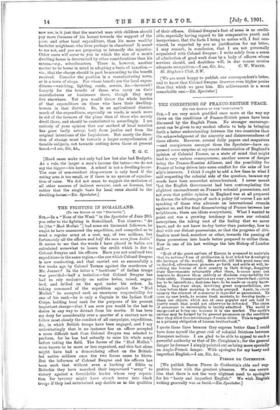THE FIGHTING IN SOMALILAND.
(TO THE EDITOR Or THE " SPECTATOR:1
Sru,—In a "Note of the Week" in the Spectator of June 29th you refer to the fighting in Somaliland. You observe : " As he [the " Mad Mullah "] had some six thousand followers, he ought to have massacred the expedition, and compelled us to send a regular army at a cost, say, of two millions, but fortunately all the officers and half the men were from India." It seems to me that the words I have placed in italics are calculated somewhat to lessen the credit which is due to Colonel Swayne and his officers. Have you not confused two expeditions in the same region,—the one which Colonel Swayne is now conducting, and that carried out so successfully a few weeks ago by Colonel Ternan against the murderers of Mr. Jeru2er ? In the latter a " backbone" of Indian troops was provided—half a battalion—but Colonel Swayne has bad to rely exclusively on native levies, raised, organ.. ised, and drilled on the spot under his orders. In taking command of the expedition against the " Mad Mullah " he accepted such an enormous responsibility for one of his rank—he is only a Captain in the Indian Staff Corps, holding local rank for the purposes of his present important charge—that I am sure you would be the last to desire in any way to detract from his merits. It has been my duty for considerably over a quarter of a century now to follow most closely the conduct of all campaigns, expeditions, Ire., in which British troops have been engaged, and I say unhesitatingly that in no instance has an officer accepted a more difficult task than Colonel Swayne was selected to perform, for be has had actually to raise his whole army before taking the field. The forces of the "Mad Mullah" were known to be more or less organised, and this fact alone might have had a demoralising effect on the British- led native soldiers once the two forces came to blows. But the influence of Colonel Swayne and his officers has been such that without even a backing of Sikhs or Beluchis they have marched their improvised " army " to victory against a formidable leader whose very reputa- tion for tyranny might have struck terror into black troops if they had entertained any doubts as to the qualities of their officers. Colonel Swayne's feat of arms is so credit- able, especially having regard to his comparative youth and inexperience, that the facts I bring to notice will, I feel con- vinced, be regarded by you as justification for my letter. I may remark, in conclusion, that I am not personally acquainted with Colonel Swayne : I write solely from a sense of admiration of good work done by a body of officers whose services should, and doubtless will, in due course receive adequate recognition.—I am, Sir, &c., C. W. WHITE. St. Stephen's Club, S.W.
[We are most happy to publish our correspondent's letter, and to know that Colonel Swayne deserves even higher praise than that which we gave him. His achievement is a most remarkable one.—En. Spectator:I


















































 Previous page
Previous page